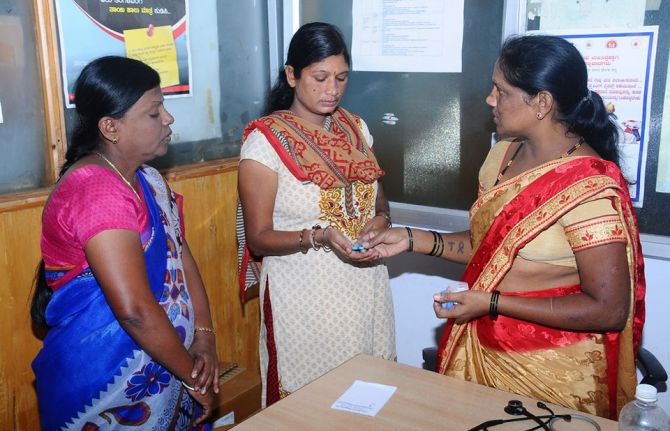

Feature Story
Lessons from the Ashodaya PrEP project in India
07 October 2020
07 October 2020 07 October 2020The Ashodaya pre-exposure prophylaxis (PrEP) demonstration project for female sex workers in south India has shown how PrEP and HIV prevention programmes can be strengthened and their implementation accelerated beyond pilot projects.
While PrEP has been shown to be highly efficacious, with nearly 100% protection if it is taken as directed, delivering a successful PrEP programme is challenging. HIV prevention efforts among sex workers have traditionally focused on condom use, and while a range of successful programmes have contributed towards the decline in new HIV infections in the Asia–Pacific region, sex workers still experience a disproportionate burden of infection. In 2019, 9% of the estimated 300 000 new HIV infections in the Asia–Pacific region were among sex workers and globally the relative risk of HIV infection is 30 times higher among sex workers than among the general population.
PrEP is a relatively recent addition to the range of HV prevention options available. It involves someone who is HIV-negative taking antiretroviral medicines prior to possible exposure to HIV. Although recommended by the World Health Organization (WHO) for all people at substantial risk of HIV since 2015, PrEP is inaccessible to the majority of key populations, including sex workers, and their partners in the Asia and the Pacific region. There is limited evidence on PrEP use among women, and particularly among female sex workers, in Asia and the Pacific.
The Ashodaya PrEP demonstration project was one of two community-led and community-owned initiatives to provide PrEP to female sex workers supported by the Bill & Melinda Gates Foundation (the other was led by the Durbar Mahila Samanwaya Committee Kolkata). Sex workers in India had been concerned by the fact that, although condom use was high, some sex workers still acquired HIV.
“Our project shows that community-led PrEP delivery can be effectively integrated into the existing HIV prevention and care services for sex workers and result in high retention and adherence. Policymakers need to consult with us, listen to us and trust us as we know what works for us and how to make it work. We have an obligation to make PrEP available as an additional prevention tool in a safe and sustainable way and we are advocating for that,” said Bhagya Lakshmi, Secretary of Ashodaya Samithi.
The PrEP demonstration project, which began in April 2016 and ended in January 2018, reported good results. High levels of continuation on PrEP were reported, with 99% of the 647 participants completing the 16 months of follow-up. For women, it is critical to take PrEP daily to maintain protection. Although adherence was only 70% at month three, this increased to 90% at month six and was 98% in the final month of the project. Self-reported adherence was verified in the blood of a subset of participants at months three and six.
The project not only helped to dispel some common fears about PrEP but showed benefits in bridging the prevention gap. Rather than undermining condom use, it remained stable. Condom use was high for occasional clients, at approximately 98%, but lower for repeat clients (87–96%) and regular partners (63%). There were also no increases in symptomatic sexually transmitted infections and no cases of HIV acquisition during the follow-up period.
Several factors contributed to the success of the Ashodaya PrEP project, including:
- Fully integrating PrEP into an existing range of health services, outreach and community mobilization. This approach recognized that PrEP is not just a medicine or a standalone service but is part of a prevention and health package, including sexual and reproductive health services.
- Communities leading the way: planning, implementation and monitoring.
- Preparing the community and ensuring ongoing engagement. An intensive process of community preparedness and ongoing engagement allowed sex workers to make informed decisions about participation.
- Addressing excluded groups early. Recognizing that many community members would miss out, the community was proactively informed that not all members would be eligible for PrEP under the demonstration project, given the limited places and scope.
- Prioritizing continued engagement over perfect adherence. Drawing on Ashodaya’s existing network of peer outreach workers allowed for individualized adherence support strategies to best meet the needs of PrEP users, both in terms of scaling up support when dips in adherence were observed and through referrals to Ashodaya’s comprehensive package of health and social services beyond PrEP.
“We cannot stop new HIV infections in Asia and the Pacific if we stick to business as usual,” said Eamonn Murphy, Director, UNAIDS Regional Support Team for Asia and the Pacific. “PrEP answers an unmet need and expands the prevention options for people at substantial risk of HIV. We need to scale up PrEP as an additional effective HIV prevention intervention. The principles of the Ashodaya PrEP demonstration project is a model not only for India but for the entire region. The lessons learned from the project are critical to informing the way forward in the prevention agenda.”
From conceptualization to planning, implementation and monitoring, the Ashodaya PrEP project was a community-led process. In 2018, the pilot project ended and analysis of the results was completed with support from UNAIDS India and WHO. Since then, Ashodaya has trained a cadre of community members as advocates for PrEP in partnership with the All India Network of Sex Workers and with support from AVAC. Ashodaya, with support from UNAIDS, WHO, the Durbar Mahila Samanwaya Committee and the All India Network of Sex Workers, is also continuing to advocate for PrEP with the Indian National AIDS Control Organization (NACO). Ashodaya is also exploring opportunities for community social franchising and marketing of PrEP to further support access. NACO has developed a draft national PrEP policy and guidelines. The community is eagerly waiting for the resumption of PrEP services.



